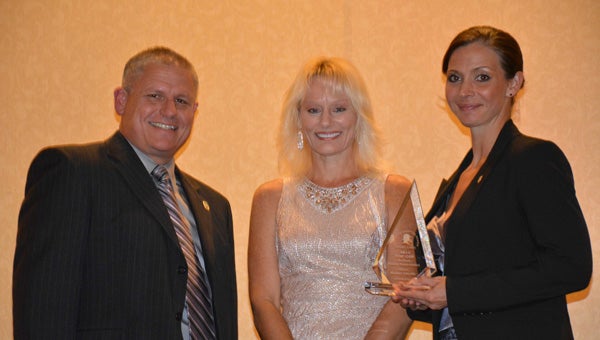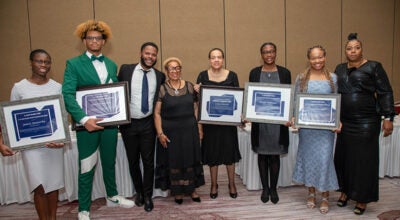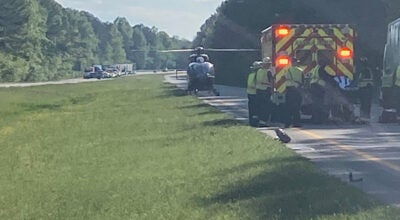Linville honored as Top Cop
Published 8:00 pm Monday, November 24, 2014

Officer Heather Linville of the Suffolk Police Department was honored as the city’s Top Cop for 2014 at the Hampton Roads Crime Line’s Dinner and Top Cop Awards in Newport News on Nov. 1. Pictured with Linville, right, are Maj. Dean Smith of the Suffolk Police Department, left, and Jan Clark, chair of the Greater Hampton Roads Regional Crime Lines.
Officer Heather Linville fell into the task of managing the Suffolk Police Department’s accreditation quest while assigned to department’s headquarters during pregnancy.
During her desk duty, she took on a couple of other programs and became known for her detail-oriented work, she said.
So when Chief Thomas Bennett began seeking accreditation through the Commission on Accreditation for Law Enforcement Agencies, he knew the perfect officer for the task.
The effort was ultimately successful, as the department received full accreditation in March 2014. It took a lot of behind-the-scenes work, said Linville, who continues the ongoing job of managing the department’s accreditation.
“When you figure out it’s something your department is going to do, you have to go through an application process,” she said.
For her work, Linville was named Suffolk’s Top Cop for 2014 and was honored at the Greater Hampton Roads Crime Line’s Top Cop Awards on Nov. 1 in Newport News. A total of 17 officers were named from law enforcement agencies in the region.
Because Chief Bennett came to Suffolk from Newport News, a department that was already accredited, he knew what it was all about, Linville said.
“He saw it as something that could be beneficial,” she said. “Only the top 2 to 5 percent of police departments in the country are accredited.”
The accreditation process requires maintaining close to 180 standards — many of which have multiple sub-standards — as well as closely tracking statistics on many aspects of what the department does.
“For those who value transparency, it provides that for them,” she said.
The standards address practically everything the department or any individuals within it might find itself or themselves doing, Linville said. Many of the standards address traffic stops, as that’s an area that not only results in a majority of complaints from citizens but also is a major safety issue for officers.
“It’s trying to uncover every stone so there’s nothing left that could surprise us or the citizens,” she said. “We are public servants. We serve the community that surrounds us. It helps us make it safer for them and for ourselves.”
Linville’s hard work contributed to a successful accreditation assessment in December 2013, when three CALEA assessors visited Suffolk and reviewed her work.
But Linville said she played only a small part in the accreditation.
“It’s a team effort,” she said. “Without everybody learning what it was and getting on board with it, we wouldn’t have been accredited. I did a little bit more paperwork than everybody else did, but it’s for everybody.”
Linville teaches a class about CALEA for the department’s post-academy for new recruits. She also plans to go to some civic league meetings to let citizens know about the program.
“It’s a partnership between us and the community,” she said. “It’s a very useful tool.”
She continues with the job because accreditation is an ongoing process. There is a review every year and a re-assessment every three years.
Linville also continues her ancillary duty as a member of the department’s Mobile Command Vehicle Response Team, for which she must be available at a moment’s notice and attend monthly training on the technology associated with the vehicle.






